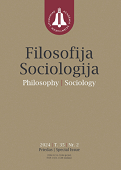The First Age of Logic in Lithuania: Propositio as Such and the Necessary Propositions
The First Age of Logic in Lithuania: Propositio as Such and the Necessary Propositions
Author(s): Vytis ValatkaSubject(s): History of Philosophy, Logic, Early Modern Philosophy, 16th Century
Published by: Lietuvos mokslų akademijos leidykla
Keywords: scholastic logic in Lithuania; 16th century; second operation of human intellect; or proposition; Smiglecki; Ortiz; necessary proposition; subject; predicate;
Summary/Abstract: This article continues the series of publications dedicated to the scholastic logic in Lithuania in the 16th century, i.e. the first century of logic in Lithuania. The author of the article focuses on the explanation of the second operation of human intellect, that is, proposition or judgement (propositio sive judicium). The article comes to the conclusion that Lithuanian scholiasts adhered to the traditional Aristotelian-scholastic definition of a proposition. Namely, the proposition was defined as a true or false sentence. In the same traditional way, opposition, equivalence (aequipollentia) and conversion were considered the main properties (propria) of the intellect’s second operation. One more conclusion is that Lithuanian logicians of the 16th century traditionally regarded necessary, or always true, propositions as the main elements of scientific knowledge (scientia). Nevertheless, while analysing terms of the necessary proposition, they presented an approach certainly close to modern logic. More concretely, both the subject and the predicate of the necessary proposition were considered not to require their actual existence in the real world.
Journal: Filosofija. Sociologija
- Issue Year: 36/2025
- Issue No: 1
- Page Range: 94-100
- Page Count: 7
- Language: English

